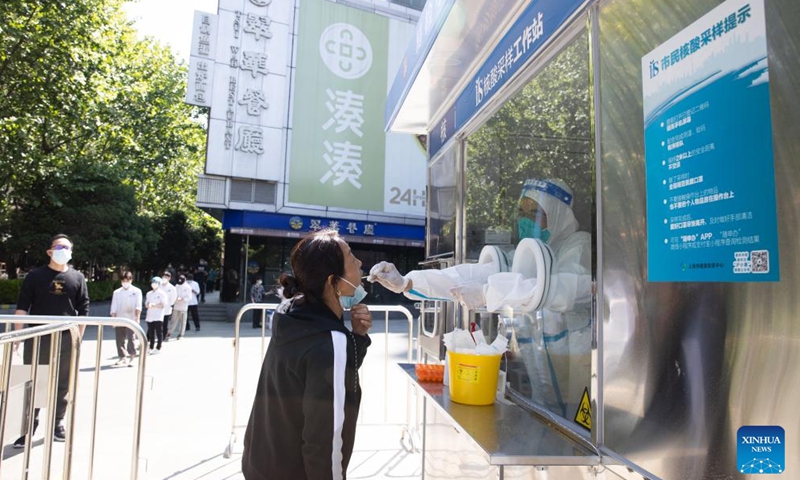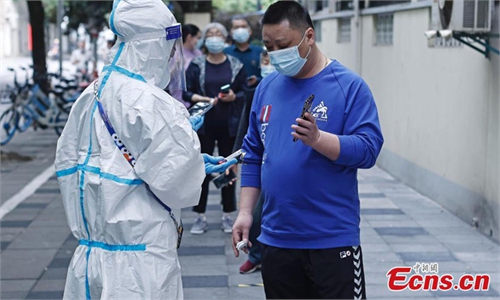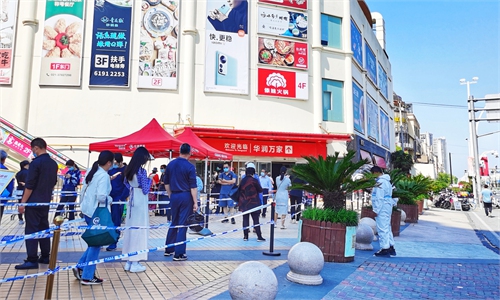Shanghai aims zero COVID-19 cases at community level by mid-May; schools, public traffics to resume gradually

A staff member takes a swab sample from a woman for nucleic acid test in Shanghai, May 8, 2022. Photo:Xinhua
Shanghai aims to reach the goal of reporting zero new COVID-19 cases at the community level by mid-May and social life including public traffic, shops and schools will resume gradually in an orderly manner, Shanghai Executive Vice Mayor Wu Qing said on Friday.
Since the outbreak of the epidemic, Shanghai has adhered to the policy of "dynamic zero-COVID" and has made every effort to contain the virus' spread to ensure people's safety and health, Wu said at Friday's press briefing.
Shanghai on Thursday reported 227 local COVID-19 cases and 1,869 asymptomatic carriers, representing the 10th consecutive day to report fewer than 5,000 cases, according to the health authorities.
The city's current epidemic situation is stabilizing and improving, but with slight fluctuations, Wu said, noting that 99 percent of COVID-19 positive cases were detected under quarantine control, with six cases reported outside the quarantine areas during the recent three days.
The decisive battle to reach zero-COVID at the community level will be continued as there are still resurgence risks especially in old residential communities and urban villages, Wu said, noting that the city has been planning on how to consolidate the hard-won results as well as to resume normal social life in an orderly manner.
Shanghai epidemic prevention is at a "critical stage" of shifting from emergency response to regular prevention and control, Wu stressed, calling for residents' cooperation and understanding in following the preventive and control measures.
The city is adjusting the emergency management of classifying the regions into "lockdown," "controlled" and "prevention" levels to a regular preventive mechanism to classify regions from high- to low-risk, according to Wu.
By Thursday, over 17.74 million residents were put under "prevention-level" regions while 2.15 million were under "lockdown."
Based on the preventive measures, regions under "lockdown" will be classified into "controlled-level" if no new positive cases are reported in seven consecutive days; while they will be classified as "prevention-level" given no cases found in another three consecutive days, said the authorities. Residents in prevention-level regions will be allowed to move freely within certain regions gradually.
The city has been planning to build 9,900 COVID-19 testing booths within a 15-minute walking distance as regular negative nucleic acid results will be needed for social activities such as work and shopping.
Among the planned 9,900 booths, 5,700 sites have been put into operation, with its daily testing capacity reaching more than 8 million tubes, as of Thursday night, according to the Shanghai authorities.
A regular high-frequency nucleic acid test mechanism is necessary to ensure the social work and production to be resumed safely and orderly as soon as possible, as nucleic acid tests are helpful to detect possible infection sources earlier and cut the transmission chain rapidly, Lu Hongzhou, head of Shenzhen's anti-epidemic expert team, told the Global Times on Friday.
For instance, residents should scan a QR code to indicate their nucleic acid test and health status before using public transportation or entering public venues, Lu said.
Shanghai will give priority to resume classes for grade 9, 11 and 12 students. Supermarkets, convenience and department stores will resume offline operations in an orderly manner as well, the authorities said. The other services including public traffic, hairdressing will also open gradually.
The city reported two more deaths, aged 88 and 89, both with preexisting diseases such as coronary heart disease and hypertension, leading the total COVID-19-related death tally to 567, Zhao Dandan, deputy director of Shanghai Municipal Health Commission, said on Friday.
The two patients didn't receive COVID-19 vaccines and their direct causes of deaths are underlying diseases, Zhao said. There are 298 severe patients and 66 critical ones being treated in hospitals as of Thursday, according to Zhao.
A Beijing-based immunologist who preferred not to be identified told the Global Times on Friday that warm weather could also be helpful to ease the epidemic as well. Along with vaccines, the seniors should also ensure nutrition and raise immunity to maintain healthy.
As of Thursday, 11 districts in the city have opened the services of COVID-19 vaccines for the seniors. Over 9.54 million doses of vaccines have been administered for more than 3.72 million seniors aged 60 and above, accounting for 64 percent of the seniors aged 60 and above, according to the authorities.
Among the 3.72 million seniors, 62 percent of them completed the whole process of vaccines and 38.6 percent of them took the booster jabs.


